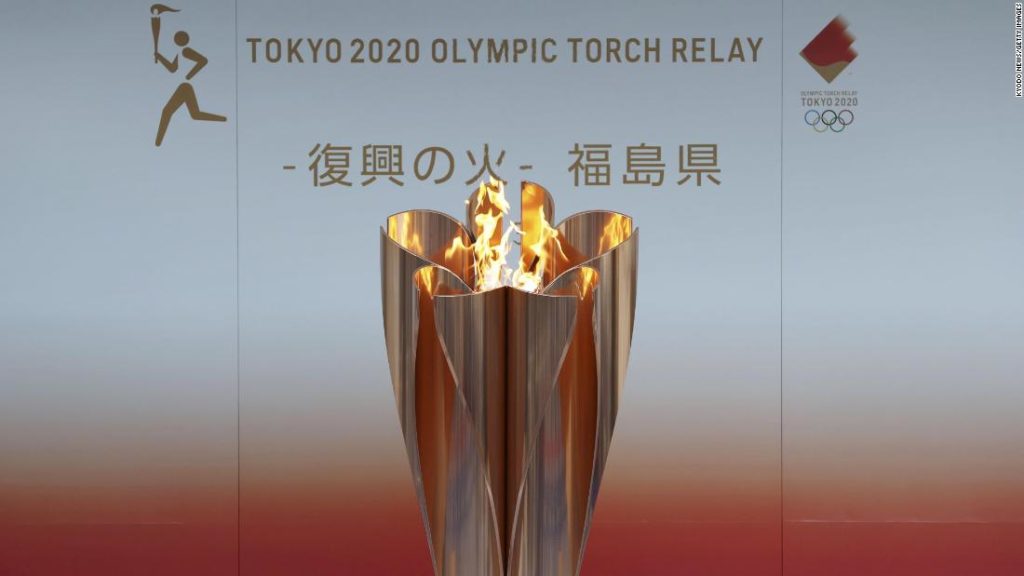“It’s really been a black eye for Japan,” said Jeff Kingston, a professor in Asian studies at Temple University in Tokyo. “The whole point was to prove brand Japan, and the rest of the world has seen a Japan that Tokyo didn’t want them to see.”
Shizuka, a Fukushima resident, who asked CNN to only use her first name, said: “Honestly, in Japan, now is not the time to hold the Olympics. She added that hosting the Olympics at this point in time would bring little benefit to the country’s residents. “There is no hope with the Olympics,” she continued.
Plan scuppered
Former Prime Minister Shinzo Abe had billed Tokyo 2020 as an opportunity to show off Japan’s mighty recovery from the 2011 earthquake and tsunami, and years of a stagnating economic performance.
Starting the torch relay in Fukushima Prefecture on March 25 was front and center to that recovery narrative. But in Fukushima residents tell a different story.
“A huge amount of money was spent [on the Olympics], but I don’t feel I have been benefited from it at all,” said 68-year-old Saki Okawara, a care worker who lives in Miharu Town, Fukushima.
Okawara, who also belongs to the local activist group “Association of Nuclear Accident Victims,” said the organizer’s narrative of a recovered Fukushima is still a long way off. “They want to hold the ‘Olympics for recovery’ after 10 years … and want to say the recovery is done. But still, at least 37,000 people are away from home and we are far from recovery,” she explained.
“The $25 billion spent on the Olympics has to be spent to help the victims of the nuclear disaster in Fukushima.” said Tosho Miyazaki, from Tokyo-based activist group “No Thank You To Olympics Disasters.” “The Olympics is highlighting the recovery of the 2011 disaster, however, Fukushima has not recovered at all.”
Miyazaki’s grassroots group is one of a number of anti-Olympics collectives that have sprung up in opposition to the country hosting the Games. Additionally, several environmental groups have expressed concern at holding the Olympic torch relay in Fukushima. Local authorities have deemed the course safe by conducting environmental radiation monitoring tests along the route, with a recent survey in December concluding that there was no reason to change plans for the Japanese leg of the torch relay.
The Japanese government has spent 37.1 trillion yen (more than $353 billion) on restoration efforts across all affected areas in the years since the catastrophe — of which 6.6 trillion yen (nearly $63 billion) focused on nuclear disaster recovery.
While a recent poll from Japanese broadcaster NHK found a majority of the country believes the Games should be canceled or postponed, others are hopeful the Olympics will offer an economic boost and momentary respite after a tumultuous few years.
Aftershocks are still being felt in the wake of Saturday night’s earthquake but for the time being, the torch relay route seems unaffected. And still, for some, the torch coming to Fukushima is a source of hope for the recovery of the region.
“I hope the Olympics will be held,” said Mihoko Kimura, a resident of Ishinomaki, Miyagi prefecture, a town destroyed by the 2011 tsunami. “The torch running in Tohoku seems to be a light of hope while many businesses have been forced to close. I think that rebuilding the economy is one of the ways to recover from the earthquake.”
For others, like Shinnosuke Sakuma in Koriyama City, Fukuoka Prefecture, the Games will be a welcome distraction from coronavirus, if only for a short time. “Under the pandemic, our activities are restricted,” Sakuma said. “Even if the Olympics is held without spectators, we can watch the Games on TV. We need to have something to enjoy under this circumstance.”
You may also like
-
Super League: UEFA forced to drop disciplinary proceedings against remaining clubs
-
Simone Biles says she ‘should have quit way before Tokyo’
-
Kyrie Irving: NBA star the latest to withhold vaccination status
-
Roger Hunt: English football mourns death of Liverpool striker and World Cup winner
-
‘Every single time I lift the bar, I’m just lifting my country up’: Shiva Karout’s quest for powerlifting glory

